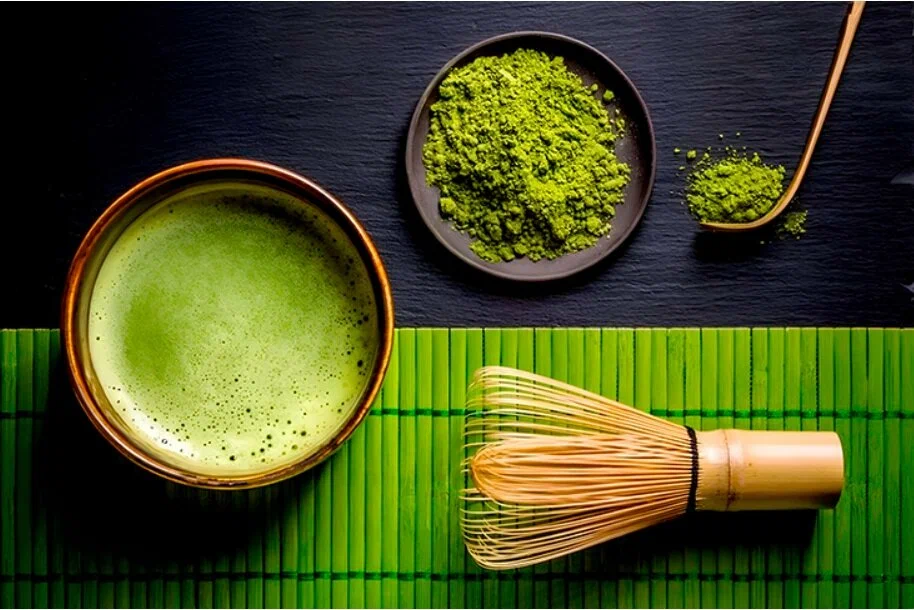What Is Matcha Tea?
Matcha tea is a finely ground powder made from shade-grown green tea leaves (Camellia sinensis), primarily cultivated in Japan. Unlike traditional green tea, where you steep and discard the leaves, matcha involves consuming the entire leaf, resulting in a higher concentration of nutrients and antioxidants.
Where Did Matcha Come From?
Originating in 12th-century Japan, matcha was deeply rooted in Zen Buddhist practices and the Japanese tea ceremony. It symbolized mindfulness, presence, and harmony. Today, it has evolved into a global health trend, enjoyed in everything from lattes and smoothies to skincare and desserts.
Matcha Tea Benefits
1. Anti-Inflammatory Powerhouse
Matcha is packed with catechins, especially EGCG, which helps combat oxidative stress and reduce inflammation. It’s a natural ally in managing chronic inflammation and supporting overall wellness.
2. Smooth, Sustained Energy
With 30–90 mg of caffeine per serving, matcha provides a gentle energy boost. Thanks to L-theanine, the energy is steady and calm—without the crash associated with coffee.
3. Mental Clarity and Focus
Matcha enhances cognitive function by improving memory, attention span, and focus. This makes it a favorite among students and professionals seeking calm concentration.
4. Supports Weight Loss
Research shows matcha can boost metabolism and fat oxidation. When paired with healthy eating and regular exercise, it may help accelerate weight loss results.
5. Detox and Skin Support
Antioxidants in matcha aid liver detoxification and promote radiant skin. Its ability to fight free radicals also supports anti-aging and may improve acne.
Matcha Tea Caffeine Content and Safe Dosage
Start with 1–2 teaspoons (1–2 cups) of matcha daily. This amount delivers caffeine and antioxidants without overstimulation. Avoid exceeding 3–4 cups per day, especially if you’re sensitive to caffeine or have liver conditions.
Matcha Tea Side Effects
Although generally safe, excessive intake can cause:
-
Insomnia or restlessness
-
Upset stomach or nausea
-
Headaches in caffeine-sensitive individuals
-
Interaction with liver or blood pressure medications
Pregnancy Note: Matcha is usually safe during pregnancy in small amounts (1 cup/day). Always consult your doctor.
What Does Matcha Taste Like?
Matcha has an earthy, slightly grassy flavor. High-quality ceremonial-grade matcha is smoother and richer with natural sweetness. Lower-grade options, often used in lattes or baking, can taste more bitter.
Tips to Improve Taste:
-
Use water at 70–80°C
-
Whisk well to remove clumps
-
Add oat milk or honey for balance
How to Make Matcha Tea at Home
Simple Matcha Recipe
Ingredients:
-
1 tsp matcha powder
-
2 oz warm water (70–80°C)
-
Optional: honey, milk, cinnamon
Steps:
-
Sift matcha into your cup.
-
Add warm water and whisk in a W motion with a bamboo whisk or frother.
-
Enjoy straight or as a latte.
Do you need a bamboo whisk?
Not necessarily. An electric frother or kitchen whisk also works in a pinch.
Matcha Tea Ceremony: A Mindful Ritual
The Japanese tea ceremony transforms matcha preparation into a meditative ritual. Every step—from sifting the powder to offering the cup—is filled with intention. At home, you can create your own peaceful matcha moment: quiet, slow, and present.
Matcha Ice Cream Recipe
Matcha isn’t just for tea—it’s perfect in desserts too.
Ingredients:
-
1½ cups heavy cream
-
1½ cups whole milk
-
¾ cup sugar
-
2 tbsp matcha + 1 tbsp hot water
-
Pinch of salt
Instructions:
-
Mix matcha and hot water to form a paste.
-
Heat milk, cream, and sugar until dissolved (do not boil).
-
Add matcha paste and cool the mixture.
-
Chill for 2 hours, then freeze in an ice cream maker or stir every 30 minutes until frozen.
You can also add matcha to yogurt, chia pudding, or smoothies for a healthy morning boost.
Frequently Asked Questions (FAQs)
Can I drink matcha daily?
Yes. 1–2 servings a day are safe and beneficial.
Does matcha contain more caffeine than coffee?
No. It contains less caffeine, but its effects last longer due to L-theanine.
Why does my matcha taste bitter?
You may be using a lower-grade powder or water that’s too hot.
Is ceremonial-grade matcha worth it?
Yes—for straight drinking. For smoothies or baking, culinary grade is sufficient.
Can matcha help with focus?
Absolutely. Its unique caffeine + theanine combination improves mental clarity.
Final Thoughts
Matcha tea blends ancient tradition with modern wellness. Whether you’re replacing your morning coffee, boosting your skin health, or looking for a focused energy lift, matcha delivers powerful benefits.
Start small, whisk well, and sip with intention. Matcha isn’t just a drink—it’s a moment of mindfulness and vitality in a cup.
Read More: Ginger Tea


